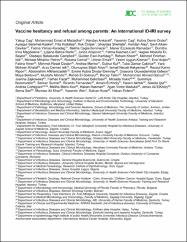| dc.contributor.author | Çağ, Yakup | |
| dc.contributor.author | Al Madadha, Mohammad Emad | |
| dc.contributor.author | Ankaralı, Handan | |
| dc.contributor.author | Çağ, Yasemin | |
| dc.contributor.author | Önder, Kübra Demir | |
| dc.contributor.author | Keskin, Ayşegül Keskin | |
| dc.contributor.author | Kızılateş, Filiz | |
| dc.contributor.author | Hakyemez, İsmail Necati | |
| dc.date.accessioned | 2023-10-26T08:01:41Z | |
| dc.date.available | 2023-10-26T08:01:41Z | |
| dc.date.issued | 2022 | en_US |
| dc.identifier.issn | 1972-2680 | |
| dc.identifier.uri | https://doi.org/10.3855/jidc.16085 | |
| dc.identifier.uri | https://hdl.handle.net/20.500.12462/13579 | |
| dc.description | Hakyemez, İsmail Necati (Balikesir Author) | en_US |
| dc.description.abstract | Introduction: Although vaccines are the safest and most effective means to prevent and control infectious diseases, the increasing rate of vaccine
hesitancy and refusal (VHR) has become a worldwide concern. We aimed to find opinions of parents on vaccinating their children and
contribute to available literature in order to support the fight against vaccine refusal by investigating the reasons for VHR on a global scale.
Methodology: In this international cross-sectional multicenter study conducted by the Infectious Diseases International Research Initiative (IDIRI), a questionnaire consisting of 20 questions was used to determine parents’ attitudes towards vaccination of their children.
Results: Four thousand and twenty-nine (4,029) parents were included in the study and 2,863 (78.1%) were females. The overall VHR rate of
the parents was found to be 13.7%. Nineteen-point three percent (19.3%) of the parents did not fully comply with the vaccination programs.
The VHR rate was higher in high-income (HI) countries. Our study has shown that parents with disabled children and immunocompromised
children, with low education levels, and those who use social media networks as sources of information for childhood immunizations had
higher VHR rates (p < 0.05 for all).
Conclusions: Seemingly all factors leading to VHR are related to training of the community and the sources of training. Thus, it is necessary
to develop strategies at a global level and provide reliable knowledge to combat VHR. | en_US |
| dc.language.iso | eng | en_US |
| dc.publisher | J Infection Developing Countries | en_US |
| dc.relation.isversionof | 10.3855/jidc.16085 | en_US |
| dc.rights | info:eu-repo/semantics/openAccess | en_US |
| dc.subject | Vaccine Hesitancy | en_US |
| dc.subject | Vaccine Refusal | en_US |
| dc.subject | Parents | en_US |
| dc.title | Vaccine hesitancy and refusal among parents: An international ID-IRI survey | en_US |
| dc.type | article | en_US |
| dc.relation.journal | Journal of Infection in Developing Countries | en_US |
| dc.contributor.department | Tıp Fakültesi | en_US |
| dc.contributor.authorID | 0000-0001-6133-9604 | en_US |
| dc.identifier.volume | 16 | en_US |
| dc.identifier.issue | 6 | en_US |
| dc.identifier.startpage | 1081 | en_US |
| dc.identifier.endpage | 1088 | en_US |
| dc.relation.publicationcategory | Makale - Uluslararası Hakemli Dergi - Kurum Öğretim Elemanı | en_US |


















